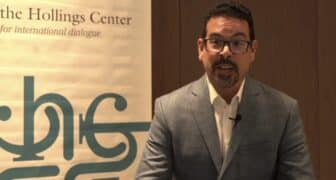After Defeat: How the East Learned to Live with the West
(Cambridge University Press, 2011)
Ayşe Zarakol
Review and author interview by George Gavrilis
Please click here for a printer-friendly PDF version of this page.
In 1933, a year when Japan was at once caught up in the throes of modernization and in search of empire across Asia, Jun’ichirō Tanizaki published his essay, In Praise of Shadows. With style that was both poetic prose and nationalist rant, Tanizaki mounted a defense of Japanese aesthetics, architecture and everyday artifacts that were being supplanted by all things Western. Tanizaki included long reflections that praised the subtlety of shadows long appreciated in Japan and disparaged the West’s garish use of light:
If light is scarce then light is scarce; we will immerse ourselves in the darkness and there discover its own particular beauty. But the progressive Westerner is determined always to better his lot. From candle to oil lamp, oil lamp to gaslight, gaslight to electric light—his quest for a brighter light never ceases, he spares no pains to eradicate even the minutest shadow (p. 31).
The Japanese, in Tanizaki’s estimation, had given up too much in their anxiety to cast off the stigma of “backwardness” and “orientalism” and look more like the West.
Ayşe Zarakol’s book, After Defeat: How the East Learned to Live with the West, takes the driving power of stigma to the next level.
People who have grown up in countries whose modernity has never been in question may not fully understand how all-consuming the stigma of comparative backwardness may be for security; how tiring it is to conduct all affairs under the gaze of an imaginary and imagined West, which is simultaneously idealizedand suspected of the worst kind of designs; or how scary it is to live continuously on the brink of being swallowed up by a gaping chasm of “Easternness,” which is simultaneously denigrated and touted as the more authentic, the more realistic choice (p. 6).
Arguing that stigma matters for states as much as for people, After Defeat explains that—in the wake of massive, historic international defeat—Turkey, Japan and Russia adopted foreign policies to respond to the idea that they were somehow inadequate and less than the West. Post-Ottoman Turkey attacked its Easternness to become more Western, post-World War II Japan ditched its militarism for an economically-driven pacifism and post-Soviet Russia (briefly) attempted openness, transparency and cooperation with the European Union and the United States.
Zarakol argues governments can react in different ways to their outsider status, but react they must. Some states may accept their stigma and do what they can to correct it, partly or wholesale. Other states may reject the idea of stigma while others still may revel in it and use it to their advantage. Her case studies of Turkey, Japan and Russia show how the different strategies play out.
Emerging from the remnants of the defeated and dismembered Ottoman Empire, Turkey chose to overcome its international stigma through a wholesale transformation. Turkey severed relations with the East and cultivated relations with the West. And so the book places the Turkish republic’s well-documented Kemalist policies (among them, the alphabet reform, the abolition of the caliphate and the overhaul of foreign policy) in a new framework. Zarakol notes that this total national makeover won great praise in Western papers such as The Daily Telegraph and The Morning Post, which in March 1937 declared Turkey to be the most peaceful country in Europe.
Although the reforms Zarakol discusses are well familiar to historians, it is her interpretation that stands out. She argues that the force of international stigma drove Turkish officials to Westernize and jettison seemingly Eastern political, economic and cultural traits. At the same time, the book makes it clear that these reforms were not imposed and “the decision to completely Westernize might have been top-down, but it was also organic” (p. 153). A majority of these reforms were undertaken in the 1920s when Turkey was relatively isolated from the West and had the Soviet Union as a sole powerful friend.
Unlike Turkey’s wholesale transformation, Japan chose to make a partial correction to the stigma. Rulers of post-war Japan ultimately settled on international and domestic policies that would pursue modernity but with a Japanese spin. The cornerstone of the new Japan was an economically-driven anti-militarism where prosperity, trade and development ruled the day. The chapter on Japan shows that this approach came out of major political battles and debates across factions whose history had Meiji-era roots. Japan’s post-war leaders thus settled on a policy of modernization short of naked Westernization. They believed this would lessen Japan’s stigma and put them in a favored position to export these values to other Asian countries, a rather insolent approach considering that Japan’s imperial expansionism had recently ravaged the region.
After Defeat bridges the 20th and 21stcenturies with a chapter on Russian post-Cold War foreign policy. Reeling from the consequences of Soviet collapse and Cold War defeat, Yeltsin’s Russia built on Gorbachev’s policy of engagement and appeared willing to make major reforms to join a club of tightly knit Western countries. However, Moscow’s pro-Western factions were primed for failure. Political and economic crises and wiggly European promises of association did not give them much traction against a resurgent group of elites who believed Russia had little to gain by following European and Western demands of democratization and economic reform. Russia would soon reverse its reformist course, reject stigmatization and revel in a foreign policy of opposition to the West.
Although the book treats Turkey, Japan and Russia in separate chapters, the cases are woven together by smart if brief comparative analysis. Zarakol writes:
I do not intend to downplay the challenges Russia has faced since the collapse of the Soviet Union, but it is important to draw attention to the fact that Russia was given the benefit of the doubt much longer post-defeat and rewarded much more easily than both Turkey and Japan for doing far less to be conciliatory. What is more, this dynamic is prominently at play again. These days, both Turkey and Japan are struggling to chart a more autonomous foreign policy course away from the influence of their traditional Western partners, and despite decades of loyalty to the West, hardly a week goes by without a proclamation from a Western observer that either country has been or is about to be lost (p. 246).
Prospective readers should note that this is not a revisionist history. Rather, After Defeat hits high notes with its unusual comparisons, elegant analysis and trenchant rethinking of international relations approaches. As such, After Defeat will appeal to foreign policy generalists, policymakers, international relations scholars as well as sociologists and political theorists. And literature buffs will be pleasantly surprised to find the likes of Orhan Pamuk and Fyodor Dostoyevsky, and their unsuspected connections to international stigma, discussed in the pages of this creative book.
Ayşe Zarakol is an International Affairs Fellow with the Council on Foreign Relations and University Lecturer of International Relations at Cambridge. She recently attended the Hollings Center’s Regional Policy Dialogue, Foreign Policy and Competing Mediation in the Middle East and Central Asia.
George Gavrilis sat down with Zarakol to ask her a few questions about After Defeat (Cambridge University Press, 2011).
Gavrilis: Did you intend to write a book about stigma from the outset?
Zarakol: Yes and no. The behavior I wanted to explain has remained the same since the very beginning of the project, and so has the comparison between Turkey, Japan and Russia. I knew that there were certain “tics” and “hang-ups”, if you will, in the ways Turks talked about the world that were not at all explained by International Relations theories I had been exposed to, which focused more on how material capability (e.g. military power or economic strength) determines how states behave. Turks tended to measure themselves constantly against an idealized West – you could see this in problems as simple as a snowstorm in Istanbul. The discussion would always go something like “If we were a more civilized country…x, y, z would not happen.” These tics are less on display these days, but anyone who is familiar with Turkey will recognize this frame. It is applied to anything from the most mundane matters of child-rearing to most critical problems of foreign policy.
Then I read more about Japan and Russia and I realized they suffered from similar hang-ups, even if the precise language problems were expressed in different ways. I thought this desire to constantly compare oneself to an idealized West may have something to do with the imperial legacy these countries shared.
In the beginning, I did not really have a way to address this commonality from a theoretical perspective – so you could say that the project proceeded inductively in that case studies came first (this is rare in academia these days). It was only after I finished my PhD and had time to move beyond the confines of International Relations as a discipline that I realized sociologists did have a concept for explaining the dynamic I was describing in the international system, which was the concept of stigma, especially as analyzed in the works of Erving Goffman and Norbert Elias. The social theories I ended up borrowing regarding stigma and the historical perspective I borrowed from macro-sociology regarding the evolution of the modern international system fit the case studies like a glove. Essentially, I was always writing about the same thing, but I acquired the correct language to write about it only in the later stages of the project.
Gavrilis: You say in the book that it is dangerous to ignore the stigma problem in international relations. How so?
Zarakol: It makes finding a solution for problems like lack of international cooperation more difficult if not impossible. It also makes mistakes more likely in foreign policy. I believe stigmatization in the international system casts a long shadow and shapes state as well individual behavior. You cannot fix problems created by stigmatization through force or money. And stigmatized actors still act differently even after the cause for their stigmatization is removed. Consider two thin individuals of the same weight – one has been thin all his life whereas the other was formerly obese. Even if their material conditions are now the same, these individuals would perceive the world differently. States and communities are not that different – if they have been stigmatized in the past, they will for instance be more sensitive to certain perceived slights even if they are now “rising powers.”
Let me give you a recent example from foreign policy. Michael McFaul’s tenure as the U.S. Ambassador to Russia has been controversial, to put it mildly. Obviously, no one expected the Kremlin to welcome him with open arms as he has written a lot about democratization in Russia and therefore at odds with the current regime. Yet McFaul also made some mistakes because he was not wary of Russia’s historical sensitivities about stigmatization. For instance, he called Russia “a wild country”automatically triggering psychological defense mechanisms that go back centuries. He made the Kremlin’s job to vilify him a lot easier.
I do not give these examples to excuse this behavior, by the way. Some may say, “Why should we be more sensitive? They should just get over it!” Well, maybe they should, but they can’t. This is how things are, at least for now. We have a saying in Turkish: “Would you rather eat grapes or beat up the vineyard owner?” If your real goal is to eat grapes, be sensitive to consequences of stigmatization in the international system.
Gavrilis: We are in an unrelenting global economic crisis and the United States and Europe have borne the brunt of it. Can the West possibly retain its international cachet and ability to set the boundaries of what is and isn’t stigmatizing?
Zarakol: I think the international cachet of the West will outlast its material power, though not forever.
As I explain in the book, the cachet helps artificially sustain some degree of economic power that would otherwise be eroding more quickly. For example credit ratings of countries or companies are not entirely objective – everyone knows this. What nobody talks about is how easier it is for non-Western countries to be downgraded. It takes a lot for Western states to be downgraded, which in turn sustains their economies. Or conversely, it is much easier for economic problems or political crises or terrorist attacks to smear the international image of non-Western states. The symbolic impact of such events is magnified in the non-West, whereas in the case of Europe and the US, they are downplayed. If something like the LIBOR scandal or even the Bush vs. Gore debacle in 2000 had taken place in a so-called “developing country” we would never hear the end of how that country’s democracy had not yet consolidated or that corruption was rampant in that country. Examples like this keep happening, yet many people in Western countries assume that everything is still basically OK with the West and every indication to the contrary is dismissed as an aberration. Even if it is granted that things are bad here, the assumption is that things must be worse over there. Nobody even bothers to check if that assumption still holds.
It is not just Westerners who believe this by the way. Non-Westerners still believe it to a great extent, despite whatever nationalist bravado they put on display. Part of this is because the “rising powers” that are starting to challenge the West have certain assumptions about the West built into their own self-narratives and histories. They still care more about what the West thinks about them than what other rising powers think. China cares and knows much more about the US or even the EU than it does about India.
But I think this may finally change in the not so distant future – possibly within our lifetime. When that happens, it will be the most radical development of the last two hundred years.








